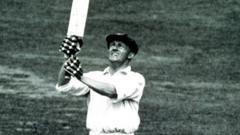As India prepared for its inaugural cricket tour of Australia in 1947-48, the nation was reeling from the upheaval of independence and partition. With turmoil at home, key players withdrew, and the team faced immense challenges, yet managed to complete the tour, underscoring the spirit of Indian cricket.
The Turbulent Birth of India’s First Test Tour to Australia

The Turbulent Birth of India’s First Test Tour to Australia
India's debut cricket tour to Australia in 1947-48 marked a pivotal moment, unfolding against the backdrop of the country’s independence and partition, highlighting the resilience of its players amid chaos.
In 1947, India was on the brink of its first cricket tour to Australia, but the journey was complicated by the country's tumultuous transition to independence and the traumatic experience of partition. This era, characterized by violent communal strife and mass migrations, cast a long shadow over the Indian cricket squad as they prepared to face Australia’s formidable team led by the legendary Don Bradman.
The cricketing spotlight was far brighter on Australia, which had just returned undefeated from England and was dubbed "Bradman's Invincibles." Meanwhile, India formed its 16-member squad under the aegis of the Board of Control for Cricket in India, represented by Anthony De Mello and designed to embody the undivided spirit of the nation. Until this tour, India had only participated in three series against England from 1932 to 1946, without a single victory.
The impetus for a national tour was somewhat buoyed by a previous unofficial series where India surprisingly defeated an Australian Services team 1-0, thus convincing Australian authorities of India’s competitive potential. Excitement and optimism buzzed around the selection, which initially included stars like Vijay Merchant and Mushtaq Ali.
However, as the horrors of partition reverberated throughout the country, the squad faced dire challenges. Merchant and Modi had to withdraw due to health issues, while Ali’s family obligations following the death of his brother led him to exit as well. The newly appointed captain Lala Amarnath faced life-threatening obstacles in his bid to reach Australia, having to navigate violent sectarian mobs en route.
Fazal Mahmood encountered similar life-threatening scenarios that forced him to abandon the tour after witnessing the chaos in Lahore. Despite this, and with the squad significantly weakened, the tour commenced, resulting in a disappointing series outcome of 4-0 in favor of Australia.
The tour not only cast a long-term light on the cricketing rivalry between the two nations but also encapsulated a moment of perseverance. It is remarkable that the 1947-48 tour even materialized against such a backdrop, marking the beginning of a storied cricketing relationship between India and Australia that continues robustly to this day.
The cricketing spotlight was far brighter on Australia, which had just returned undefeated from England and was dubbed "Bradman's Invincibles." Meanwhile, India formed its 16-member squad under the aegis of the Board of Control for Cricket in India, represented by Anthony De Mello and designed to embody the undivided spirit of the nation. Until this tour, India had only participated in three series against England from 1932 to 1946, without a single victory.
The impetus for a national tour was somewhat buoyed by a previous unofficial series where India surprisingly defeated an Australian Services team 1-0, thus convincing Australian authorities of India’s competitive potential. Excitement and optimism buzzed around the selection, which initially included stars like Vijay Merchant and Mushtaq Ali.
However, as the horrors of partition reverberated throughout the country, the squad faced dire challenges. Merchant and Modi had to withdraw due to health issues, while Ali’s family obligations following the death of his brother led him to exit as well. The newly appointed captain Lala Amarnath faced life-threatening obstacles in his bid to reach Australia, having to navigate violent sectarian mobs en route.
Fazal Mahmood encountered similar life-threatening scenarios that forced him to abandon the tour after witnessing the chaos in Lahore. Despite this, and with the squad significantly weakened, the tour commenced, resulting in a disappointing series outcome of 4-0 in favor of Australia.
The tour not only cast a long-term light on the cricketing rivalry between the two nations but also encapsulated a moment of perseverance. It is remarkable that the 1947-48 tour even materialized against such a backdrop, marking the beginning of a storied cricketing relationship between India and Australia that continues robustly to this day.





















